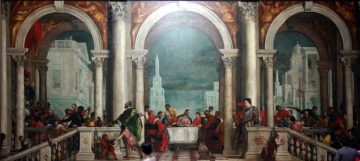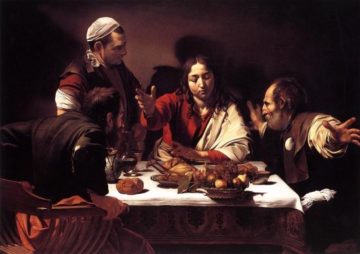The Gospel for the Twenty-eighth Sunday of Ordinary Time invites us to a wedding banquet. Fr. Paul Gallagher, OFM encourages us to reflect on this parable of Jesus. The content is edited by Franciscan Sister of Christian Charity Sister Anne Marie Lom and Joe Thiel. The excerpts from the Sunday readings are prepared by Joe Thiel. To read or download the complete pdf with excerpts for your prayer, please click here Franciscan Gospel Reflection October 11 2020. Excerpts are from the Lectionary for Mass for Use in the Dioceses of the United States of America, second typical edition © 2001, 1998, 1997, 1986, 1970 Confraternity of Christian Doctrine, Inc., Washington, DC. Used with permission. All rights reserved. No portion of this text may be reproduced by any means without permission in writing from the copyright owner. Photos Banquet ; Jesus at table
Matthew 22:1-14
Jesus again in reply spoke to the chief priests and elders of the people in parables, saying, “The kingdom of heaven may be likened to a king who gave a wedding feast for his son. He dispatched his servants to summon the invited guests to the feast, but they refused to come. A second time he sent other servants, saying, ‘Tell those invited: “Behold, I have prepared my banquet, my calves and fattened cattle are killed, and everything is ready; come to the feast.”‘
Some ignored the invitation and went away, one to his farm, another to his business. The rest laid hold of his servants, mistreated them, and killed them. The king was enraged and sent his troops, destroyed those murderers, and burned their city. Then he said to his servants, ‘The feast is ready, but those who were invited were not worthy to come. Go out, therefore, into the main roads and invite to the feast whomever you find.’ The servants went out into the streets and gathered all they found, bad and good alike, and the hall was filled with guests.
But when the king came in to meet the guests he saw a man there not dressed in a wedding garment. He said to him, ‘My friend, how is it that you came in here without a wedding garment?’ But he was reduced to silence. Then the king said to his attendants, ‘Bind his hands and feet, and cast him into the darkness outside, where there will be wailing and grinding of teeth.’ Many are invited, but few are chosen.”
Background:
This is the third consecutive Sunday gospel where Jesus is addressing the Jewish religious leaders. Two weeks ago, the gospel contained the parable of the two sons who were told by their father to go to work in the vineyard. Jesus concluded the parable by telling the leaders that tax collectors and prostitutes were entering God’s realm before them (Matthew 21:28-32). The gospel for last week was the parable of the tenants who refused to share the harvest with the landowner (Matthew 21:23-43). Today’s gospel is another parable that in its final form focuses on the consequences of refusing the invitation to the reign of God. One of the common themes running through all three is that those who appear to enjoy the favor of God have rejected their responsibilities/relationship, and others assume the responsibility/relationship in their stead.
As with the other two parables, scripture scholars believe that this parable, as told here by Matthew, went through stages of development. The parable that Jesus would have told was the simple story about being invited to a great banquet and the need to be ready to respond to the invitation. In the second stage, the Christian community added elements to the story that would have enhanced its reference to Jesus. The celebration became a wedding feast prepared for his son by a great king. God is the king, and the son is Jesus. Some who refused to accept the invitation are those who reject Jesus and his teaching. The last development of the parable happened when the new Christian community wanted to stress the importance of living faithfully their new relationship. To make that connection, they added to the parable the person without a proper garment for the banquet. The Christian community now includes Jews and Gentiles, and members who are struggling to remain faithful, and others who have become apathetic.
The parable itself reflects a common scenario of the day. Typically, banquets were for the elite of society. People associated at banquets with others of a similar status in the community. When a banquet was being planned, a preliminary invitation was sent. Those on the guest list checked among their peers to see who was going to attend, and more importantly, who was going to decline the invitation. When the banquet was ready, a second announcement was made for guests to assemble. In the parable, those who are refusing offer flimsy excuses, and others’ refusals are confrontational. The host’s retaliation would be expected. The host, by going to the crossroads or city squares, is inviting those who would not have been normally included. The squares were the gathering place of the community; people from the elite as well as the lowest parts of society would be there. The social distinctions that regulate honor and acceptable relationships are being torn down by this king. A new social order is being established—but it is not without expectations. One must still have a wedding garment.
In the first reading for this Sunday (Is 25:6-10), the prophet Isaiah uses the image of a great banquet as the culmination of God’s saving activity. It is an image designed to bring hope to those whose lives were filled with great suffering. That reading offers a focus for reflection on the gospel. One suggestion would be to see the kingdom of God as an attitude we are invited to participate in and live in our lives. God’s invitation is for us to live God’s radical generosity, compassion, and forgiveness each day of our lives, with those in our families, in our neighborhoods, and elsewhere in the world. There are those who clearly refuse that invitation, and those who would like to accept it but struggle. As a church, we are also blessed with those who seem to engage God’s hospitality in a remarkable way. These saints in history and in our communities mentor the rest of us in living the kingdom of God today.
Reflection Questions:
- Given the conditions of our present world, what questions would go through you before you would respond to an invitation to a banquet?
- Take some time to name some of the things that make the image of a wedding banquet a good comparison to the reign of God?
- Do you know people who seem to be gifted at inviting and including those who might be considered “odd” or “outsiders”?
- Where in your community are the places that people are welcome no matter their social standing, background, or political opinions?
- In the parable, with whom do you find it easiest to identify: the king, the king’s son, the invited guests, the king’s servants, the king’s soldiers, those invited later, or the guest without a proper garment?
- Can you take some time to talk with God about God’s invitation to you, how you have been responding to that invitation, or perhaps your desire to carry God’s invitation to others?




